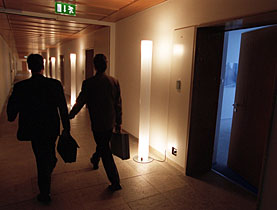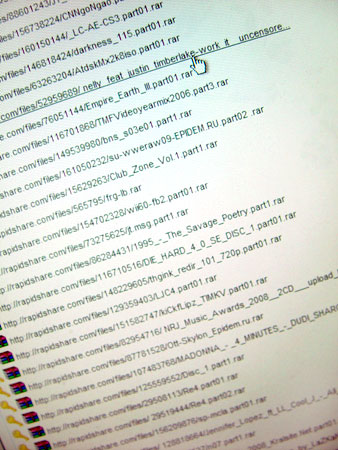Spies target banks for the secrets they hold

As Swiss authorities work to preserve the country's banking secrecy laws, foreign spies are stepping up efforts to uncover private financial data on their own.
Jürg Bühler, acting director of Switzerland’s counter-intelligence agency, says foreign services are increasingly interested in the financial data locked in Swiss banks, especially as the global hunt for undeclared assets stiffens.
“It’s not just about collecting intelligence on military or political or industrial data of Swiss enterprises but, more specifically today, financial data,” Bühler told swissinfo.ch. “One reason, of course, is tax issues.”
Bühler says it is difficult to quantify exactly how much more effort foreign agents are dedicating to crack Swiss banks and much of the snooping happens in the digital fog of cyberspace. Switzerland did block 21 suspected spies from entering the country under diplomatic cover in 2008, up from eight in 2007 and just two in 2006.
Those measures were preventative and no arrests have been made in an espionage case this year. Moreover, James Nason, spokesman for the Swiss Bankers Association, says the country’s financial institutions are “fully aware” of such threats and a security commission staffed with experts deals with these issues.
“People don’t have to get paranoid,” Bühler said. “In general, there is no specific risk that an ordinary customer would be targeted by foreign intelligence. People have to make a clear assessment of their own importance and most people are probably not that important.”
From the East
That foreign states would be trying harder to peel the lid off Swiss financial institutions is not new.
After all, the American Central Intelligence Agency (CIA) was caught sniffing around confidential SWIFT transactions. Last year German agents paid an insider $4 million for data on clients at a Liechtenstein bank last year. After that, Berlin targeted tax havens and helped ignite a crackdown.
Bühler says cases like those mean Switzerland cannot let its guard down.
“We have reports of cars with foreign number plates parked for some time outside Swiss banks with people doing nothing other than watching who’s coming into the bank and leaving,” Bühler said. “Of course we cannot prove it is spying but these are activities that we are not willing to tolerate in Switzerland.”
Bühler said he could not name names but did say much of the suspected espionage today comes from eastern countries. The bulk of the 21 “burned” diplomats were from those regions, he said, stressing there was no known link between them and any illegal activity already carried out on Swiss soil.
“We are doing more but we also have more information from our international partners,” Bühler said, in explaining the leap in entry bans. “We had this increase but how it will develop, we’ll have to see.”
Competitive advantage
Marc Henauer, director of Melanie, a federal cyber-security unit, says the increase in suspected espionage against financial institutions could be related to a shift in the way spies work today. There is more information stored on computer networks, meaning attempts to get it are sure to increase as well.
“In the past if you wanted a document you had to steal the briefcase,” he told swissinfo.ch. “Now you just infiltrate the network where the diplomat has all of his beautiful documents stored.”
But the breadth of foreign activity on Swiss soil does not stop with snooping around databanks. Bühler said that several states, like Russia, France and the US, have invested more manpower and resources in gathering economic intelligence to help their national enterprises compete in a tight global marketplace.
“In addition to stimulus money to help struggling companies stay afloat, there can be other ways of helping them,” he said. “If there’s hard competition for military investments or other billion-dollar projects, you want to have the details of a competitor’s offer.”
A 75-page domestic security report released by the DAP in June offers an example. Swiss agents say they suspect Russian spies are linked to crude oil businesses based in the former Soviet Union that do nearly 75 per cent of their trading in Geneva.
In the end, Bühler says people just need to be aware of the issue and treat information sent over the internet with caution since it is very difficult to tell who might be looking.
Another recommendation: “Be honest on tax issues,” he said.
Tim Neville, swissinfo.ch
The Department of Analysis and Prevention releases a report each year detailing the state of Swiss internal security.
The document released in June discusses issues such as Islamist terrorism, violent extremism, organised crime, cyber crime, hooliganism and illegal intelligence gathering.
Extremism: The report highlighted a 30 per cent decrease of extreme-rightwing violence to 24 incidents. The number of concerts by rightwing bands increased from ten in 2007 to 15 in 2008. Leftwing violence centred mostly in Zurich, where there were more attacks on police stations than in previous years.
Organised crime: Criminal groups out of the former Soviet Union continue to use Switzerland to launder money, move drugs and launch sales tax schemes. About 75 per cent of Russia’s crude oil exports and virtually all of Kazakhstan’s are traded in Geneva. “Crude oil businesses operating [in the former Soviet Union] are suspected of working hand-in-glove with the intelligence services there,” the report says.
Tamils: Before the end of the Sri Lankan civil war in June, the Swiss branch of the Liberation Tigers of Tamil Eelam (LTTE) placed increased pressure on Tamil expatriate communities in Switzerland. The LTTE held propaganda events to discipline and monitor the diaspora and make direct demands for funds.

In compliance with the JTI standards
More: SWI swissinfo.ch certified by the Journalism Trust Initiative













You can find an overview of ongoing debates with our journalists here . Please join us!
If you want to start a conversation about a topic raised in this article or want to report factual errors, email us at english@swissinfo.ch.